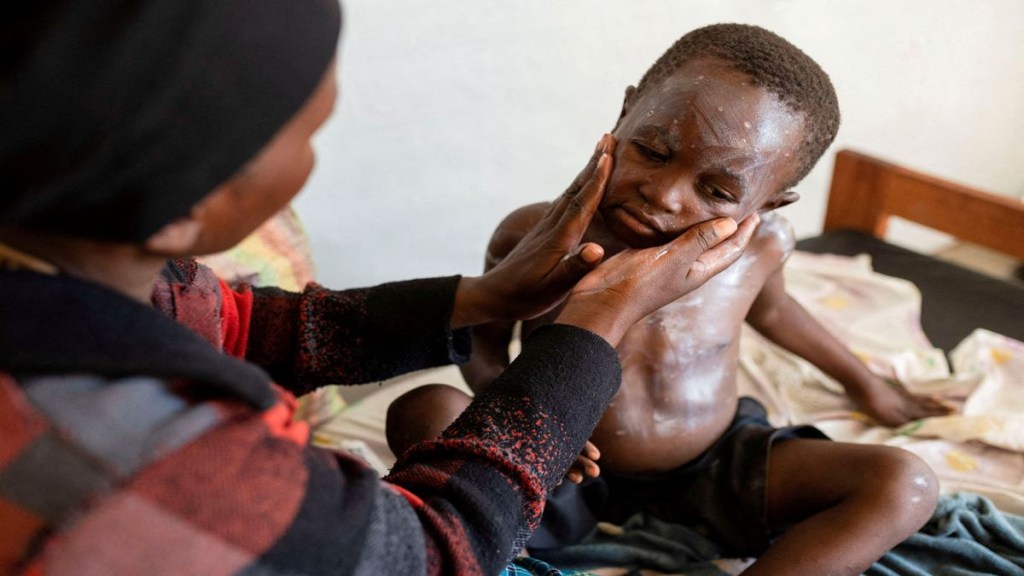Mpox FAQs: The rising number of mpox cases has become a cause of concern across the world. Following the continued spike in cases of mpox, the World Health Organization (WHO) declared mpox a global health emergency and flagged the current outbreak an ‘international concern’.
The outbreak has been triggered by a new strain that has led to surge in mpox cases different parts of Africa and even beyond the continent.
Starting with Democratic Republic of Congo which accounts for almost 96 per cent of all cases in Africa, the new strain has been identified in countries that never reported any mpox cases before.
Over 17,000 cases of the deadlier strain of the virus have been found across the continent. Monkeypox was last declared a global health emergency in 2022. Other than Africa, mpox has been detected in Sweden, Pakistan, Philippines and Thailand.
FAQs Answered | Mpox outbreak, symptoms, causes, treatment and vaccines
What is mpox?
Mpox virus is a viral illness caused by the monkeypox virus, a species of the genus Orthopoxvirus. Two different clades exist: clade I and clade II. According to the WHO, while smallpox was eradicated in 1980, mpox continues to occur in countries of central and west Africa. Since May 2022, cases have also been reported from countries without previously documented mpox transmission outside the African region. Evidence of monkeypox virus infection has been found in animals including squirrels, Gambian pouched rats, dormice, different species of monkeys and others.
How mpox occurs in humans?
Mpox is a zoonotic disease that is transmitted from animals to humans. According to the WHO, mpox cases are often found that close to tropical rainforests where there are animals that carry the virus. The disease can also spread from humans to humans. It can be transmitted through contact with bodily fluids, lesions on the skin or on internal mucosal surfaces, such as in the mouth or throat, respiratory droplets and contaminated objects.
How to mpox is diagnosed?
Mpox is detected by polymerase chain reaction (PCR) test. The best diagnostic specimens are taken directly from the rash – skin, fluid or crusts, or biopsy where feasible.
What are the symptoms of mpox?
Mpox (monkeypox) presents with fever, an extensive characteristic rash and usually swollen lymph nodes. According to the global health agency, it is important to distinguish mpox from other illnesses such as chickenpox, measles, bacterial skin infections, scabies, syphilis and medication-associated allergies. Some of the common symptoms include:
- fever,
- intense headache,
- lymphadenopathy (swelling of the lymph nodes),
- back pain,
- myalgia (muscle ache),
- and an intense asthenia (lack of energy).
“The febrile stage is followed by the skin eruption stage, lasting for 2 to 4 weeks. Lesions evolve from macules (lesions with a flat base) to papules (raised firm painful lesions) to vesicles (filled with clear fluid) to pustules (filled with pus), followed by scabs or crusts,” it stated.
Is mpox fatal?
The proportion of patients who die has varied between 0 and 11 percent in documented cases and has been higher among young children, WHO stated. It is important to note that death rates in different settings may differ due to several factors, such as access to health care and underlying immunosuppression, including because of undiagnosed HIV or advanced HIV, according to the UN health agency.
In most cases, the symptoms of mpox go away on their own but, in some people, the illness can be severe or lead to complications and eventual death.
Who is at high risk?
Newborn babies, children, people who are pregnant and people with underlying immune deficiencies – such as from advanced HIV – may be at higher risk of more serious mpox disease and death.
Is there a vaccine for mpox?
The UN health agency recommends several vaccines for use against mpox. However, mass vaccination is not recommended. At present, WHO recommends use of MVA-BN or LC16 vaccines, or the ACAM2000 vaccine when the others are not available.
How can you prevent mpox?
WHO maintains that cleaning and disinfecting surfaces or objects and cleaning your hands after touching surfaces or objects that may be contaminated can help prevent transmission.
“The risk of getting mpox from animals can be reduced by avoiding unprotected contact with wild animals, especially those that are sick or dead, including their meat and blood,” it stated.
Moreover, in countries where animals carry the virus, any food containing animal parts or meat should be cooked thoroughly before eating.
